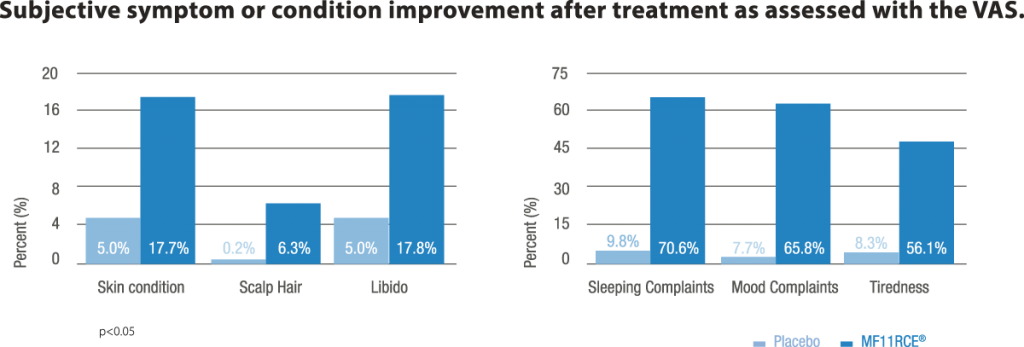M. Lipovac, P. Chedraui, C. Gruenhut, A. Gocan, C. Kurz, B. Neuber and M. Imhof
Effect of Red Clover Isoflavones over Skin, Appendages, and Mucosal Status in Postmenopausal Women
Published in Obstretics and Gynecology International, Volume 2011
Number of patients: 109
| Study Setting | MF11RCE® Group | Control Group |
| Inclusion Criteria | Postmenopausal women (amenorrhea >12 months), 40 years or older with moderate-to-severe menopausal symptoms (Kupperman index ≥15) | Postmenopausal women (amenorrhea >12 months), 40 years or older with moderate-to-severe menopausal symptoms (Kupperman index ≥15) |
| Exclusion Criteria | positive pregnancy test, nonwillingness,on hormonal therapy (HT), known isoflavone hypersensitivity | positive pregnancy test, nonwillingness,on hormonal therapy (HT), known isoflavone hypersensitivity |
| Parameter | skin, appendages, and mucosal status and libido, tiredness, and urinary, sleep, and mood complaints | skin, appendages, and mucosal status and libido, tiredness, and urinary, sleep, and mood complaints |
| Treatment | MF11RCE® 80 mg for a 90-day period. After a 7 day washout period, subjects switched to receive the opposite treatment for another 90 days. | Plazebo for a 90-day period. After a 7 day washout period, subjects switched to receive the opposite treatment for another 90 days. |
Introduction
As a result of increased life expectancy, nowadays, women spend more than one third of their lives in a state of estrogen deprivation which in turn leads to a number of significant long-term changes. Indeed, two out of three women in the menopausal transition present different complaints . Increased osteoporosis and cardiovascular risk, vasomotor episodes, and sleep disturbances have been the main research topics and focus of treatment. Other aspects such as urinary complaints, loss of libido, and changes in hair, nail, skin, or mucosal status have often been neglected by health care providers but not by women themselves.
Hormone therapy (HT), using different estrogenic compounds, has shown its effectiveness over a number of these complaints; nevertheless, current HT use has become controversial due to suspected increased risk of breast cancer and cardiovascular disease.
Reports indicate that isoflavones exhibit estrogenic activity through the activation of estrogen receptors and also antiestrogenic activity by competitive binding to the ER and estradiol (E2) inhibition.
After several years of clinical research with Red Clover, there is evidence supporting their positive effects in climacteric women in terms of vasomotor symptoms, bone mineral density, mood, vaginal and sexual health, and serum lipids. Despite this, RC data on skin, appendages, including mucosal sites, are scarce
or lacking.
Aim of the Study
The aim of the present study was to evaluate in postmenopausal women the effect of MF11RCE® over subjective status of skin, appendages, and several mucosal sites. In addition, libido, tiredness, and urinary, sleep, and mood complaints were also evaluated.
Materials and Methods
After being informed about the research and providing written consent, participants were randomly assigned to receive either 80 mg MF11RCE® (Group A) or placebo of equal appearance (Group B) for a
90-day period. After a 7-day washout period, subjects switched to receive the opposite treatment for another 90 days.
Studied variables related to subjective skin, appendages, and mucosal status and libido, tiredness, and urinary, sleep, and mood complaints were measured for each studied group at 90 and 187 days using a visual analog scale (VAS) scored from 0 to 100. Scores were indicative of subjective percent improvement of the symptom or condition.
Patients & Study Design
A prospective randomized, double-blind, placebo-controlled trial was carried out from May 2003 to November 2004 at the Study Center Med XIX and the Department of Gynecological Endocrinology and Reproductive Medicine, General Hospital of the Medical University of Vienna, Vienna, Austria.
Postmenopausal women (amenorrhea >12 months), 40 years or older with moderate-to-severe menopausal symptoms (Kupperman index ≥15) were recruited.
Statistical Analysis
Statistical analysis was performed on an intention-to-treat basis using SPSS software package. Data are presented as means (standard deviations), medians (interquartile ranges [IQR]), and percentages. The Shapiro-Wilk test was used to determine the normality of data distribution. Differences between groups were analyzed with the Mann-Whitney (continuous non parametric data) or the Chi-square test (percentages). Changes after each treatment phase within studied groups were assessed using the Wilcoxon rank test. A p-value < 0.05 was considered as statistically significant.
Results
Women in both studied groups reported a higher VAS subjective percent improvement of scalp hair and skin status, libido, mood, sleep, and tiredness after MF11RCE® intervention as compared to placebo.
In general, reported improvement over urinary complaints, nail, body hair, and mucosa (oral, nasal, and ocular) status did not differ between treatment phases.
Overall satisfaction with treatment was reported higher after MF11RCE® intervention in both assigned groups as compared to placebo.
No side effects were encountered after treatment with the active compound or the placebo group.
Discussion
In the present study, women of both groups reported better subjective improvement of skin condition (better texture, moisture, and overall condition) after MF11RCE® phase as compared to placebo.
ER1 and ER2 have been shown in certain skin layers but expressed differently according to the skin region.
It has been reported that HT clinically improves skin elasticity, thickness, and hydration and reduces shrinks. Surprisingly, our results seem to favor the fact that not only ER1 yet also ER2 can be expressed in the epidermis of different anatomical sites. Despite this, we must bear in mind isoflavones’ SERM profile displaying also anti-inflammatory, UV protective, and wound healing potentials.
Conclusion
MF11RCE® supplementation exerted a subject improvement of scalp hair and skin status as well as libido, mood, sleep, and tiredness in postmenopausal women.
Practical Benefits
In postmenopausal women, MF11RCE® supplementation may exert subjective improvement of
- skin condition (better texture, moisture, and overall condition),
- scalp hair status (better texture, less fragility, and overall condition),
- libido,
- mood and sleep complaints,
- tiredness, and
- thus, improve quality of life in menopause.


